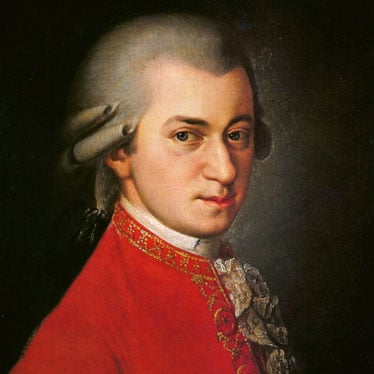
Every student of music is familiar with at least a few works composed by Mozart. In fact, his works have been celebrated, studied, and performed since he began writing, at the age of six, and have established his lasting fame as a prominent part of Western history. This gifted, multi-talented musician, like other geniuses, lived an exciting, turbulent life. His legacy lives on and is renewed with each new generation who experiences his greatness.
Mozart’s life is filled with amazing facts which are remarkably well-preserved given that he lived during the Classical period. Although he lived a relatively short life, his intellect and intelligence were noticed early on, and in his 35 years of existence he truly altered our world. These 20 amazing facts about his life can help you better understand his music and develop a deeper appreciation for his musical genius.
- Christened Johannes Chrysostomus Wolfgangus Theophilus Mozart, he was born on January 27, 1756, in Salzburg, in what is now Austria. This ecclesiastic principality was part of the Holy Roman Empire at the time, and Mozart was a staunch Catholic.
- His father, Leopold Mozart was a native of Germany and he also composed music, but was primarily a musician for the Prince Archbishop of Salzburg and pedagogue. He wrote a violin textbook that was well received when published in the year that Mozart was born.
- When just three-years-old, Mozart would listen to his sister’s instruction on the clavier (a string keyboard instrument like the harpsichord or the piano), and begin to strike thirds, being delighted with the blending of pitches.
- Mozart began his training at the age of five and could play the clavier faultlessly, and had already begun composing small snippets of music by that time. His father was his teacher, instructing him in languages and other academic areas,.
- His parents had six children, but only he and his eldest sister, Maria Anna, nicknamed "Nannerl" survived infancy.
- He composed over 600 works that are cataloged in the “Kochel,” and numbered according to the order in which they were composed. His earliest works, K. 1-5 were written in childhood, and continue to his unfinished Requiem, which is number K. 626.
- From the time he was seven (1762), he began traveling with his father (and family) to perform in various locations around Europe. Notable locations include the Imperial Court in Vienna and Prague, as well as Courts in Munich, Paris, and London.
- His first symphony was written when he was only eight-years-old.
- During the years when his family toured, he met a number of important influences, including J.C Bach, who he visited in London in 1763 -1766.
- While traveling with his father to Rome, having heard Allegri’s Miserere in the Sistine Chapel, Mozart transcribed it from ear, creating an unauthorized copy of a work that was jealously guarded by the Vatican.
- Returning from Italy in 1773, he garnered quite a bit of success, but felt stifled by the pay of a court musician for Prince Archbishop Hieronymus Colloredo, and resigned his position in 1777.
- Although he was encouraged to return to his court position, Mozart wanted to pursue a career independent from royal patronage, changing the course of his life.
- Like many artistic personalities, his life was characterized by volatility, and periods of prosperity and enthusiasm were intersperse with times of depression and insolvency.
- He was awarded the Order of the Golden Spur (a papal order of knighthood, bestowed on individuals who have contributed to the fame of the Church) by Pope Clement XIV in 1770, for his many religious compositions.
- Towards the end of the decade of the 1780’s, his life was racked by financial woes, having limited his appearances. Maynard Solomon has suggested that this was a time of deep depression for the talented virtuoso.
- During his final year of life (1791), he was on the road to personal recovery and very productive until his illness struck.
- No one is actually sure of the exact cause of his untimely death, although many people have speculated on the source.
- Interestingly, his lifelong rival, Antonio Salieri claimed that he had poisoned Mozart, but this was never verified and thought to have been false.
- His death, on November 20, 1791, sparked a surge in his reputation.
- Joseph Haydn once told Mozart’s father, “I tell you before God, and as an honest man, your son is the greatest composer known to me by person and repute, he has taste and what is more the greatest skill in composition."
The music is not in the notes, but in the silence between.— Wolfgang Amadeus Mozart
These facts are located in the resources listed on Mozart’s Wikipedia page, cultivated from a number of notable historic biographies and personal writings. Visit your local library to learn more about Mozart’s genius.


